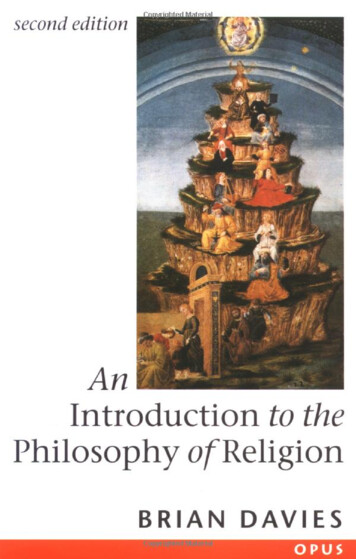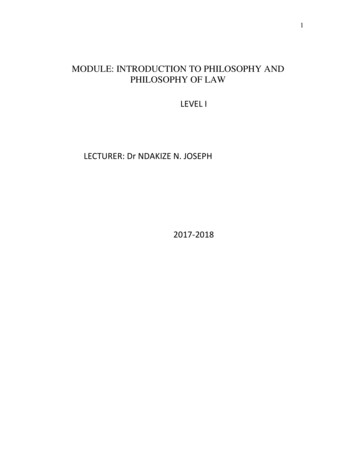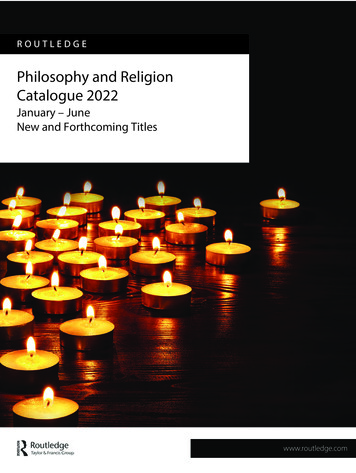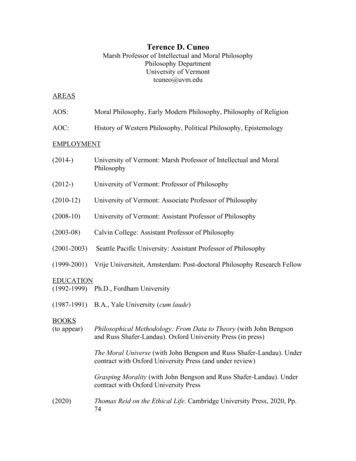
Transcription
An Introduction tothe Philosophy ofReligionBRIAN DAVIESOxford·New YorkOXFORD UNIVERSITY PRESS
Oxford University Press, Walton Street, Oxford OX2 6DPOxford New YorkAthen.s Auckland Bangkok BombayCalcuii(J Cape Town Dares Salaam DelhiFlorence Hong Kong Istanbul KarachiKuala Lumpur Madras Madrid MelbourneMexico City Nairobi Paris SingaporeTaipei Tokyo Torontoand associated companies iltIkrlin lbadanOxford is a· trade mark of Oxford University PressC Brian Davies 1993First published 1982 as an Oxford University Press paperbackand simultaneowly in a hardback edition71ris new edition first published 1993 as an Oxford University Press paperbackand siJnultaneOUJI/y in a hardback editionAll rights reserved No part of this publication may be reproduced,stored in a retrieval system, or transmitted, in any form or by any means,without the prior permission in writing of Oxford University Press.Within the UK, exceptions are allowed in respect of any fair dealing for thepurpase of research or private study, or criticism or review, as permilledunder the Copyright, Designs and Patents Act, 1988, or in the case ofreprographic reproduction in accordance with the terms of the licencesissued by the Copyright Licensing Agency. Enquiries concerningreproduction outside these terms and in other countries should besent to the Rights Department, Oxford University Press,at the addre.YS aboveThis book is sold subject to the co11dition that it shall not, by wayof trade or otherwise, be lent, re-sold, hired out or otherwise circulatedwithollt the publishers prior consent in any form of binding or coverother than that in which it is published and without a similar conditionincluding thLv condition being imposed on the subsequent purchaserBritish Library Cataloguing in Publication DataData availableLibrary of Congress Cataloging in Publication DataDavies, Brian.An introductio11 to the philosophy of religion I Brian Davies p.Includes bibliographical references and index.I. Religion-Philosophy.200'.1-dclOBL5l.D363I. Title.1993ISBN 0-19-289235-5 Pbk92-184887 9 10 8 6Printed in Great Britain byBiddies Ltd.,Guildford & Ki11g's Lynnem.
For Peter Geach, Elizabeth Anscombe,Gareth Moore, and James Sadowsky
AcknowledgementsA number of people have been kind enough to comment onmaterial which has found its way into this book . In particular,I must thank Elizabeth Anscombe , Peter Geach , Paul Helm,Herbert McCabe , OP, Hugo MeyneH, Alan Ryan , JamesSadowsky , SJ , Stephen Salter, Richard Swinburne , SimonTugwell , OP, K. V. Wilkes, Christopher Williams , and MarkWyn n . None of these people should be taken as agreeing withthe content of the book as it stands. But I think that they havehelped me to make it a better text than it would have beenwithout their advice . My thanks also go to Jean van Altena forher excellent work as copy-editor of the book.BlackfriarsOxford
ContentsIntroductionI2345678910I1Philosophy and Religious BeliefTalking about GodGod and EvilThe Ontological ArgumentThe Cosmological ArgumentThe Argument from D esignExperience and GodEte rni tyMorality and ReligionMiracleLife after DeathNotesBibliographyI n de xixI2032557494I201411681 90212235252257
Introductionis difficult to say what the philosophy of religion is . Onemight define it as 'philosophizing about religion' . But peopledisagree about the nature of philosophy and religion , so thisdefinition has its drawbacks. Philosophy of religion is now avery flourishing branch of philosophy. Thirty years or so ago ,specialists in philosophy of religion were a rare breed. Butthey are now very common , and they publish a lot . Many ofthem would describe themselves as philosophers of religion .Yet it. would be rash to conclude from this that we can e asi lydefine 'the philosophy of reli gio n It is not , for exa m ple ad iscipl ine dist ingui s hable from others as chemistry is fromnee dle wor kIn this book I do not attempt the perilous task of definingphilo so phy of religion' . My intention is to offer an intro ductory look at some of the topics traditionally thought to fallwithin its scope. The most prominent of these is the existenceof God, so much of what follows is devoted to that issue andto matters which arise in connection with it. I also consider therel ationshi p between morality and religion , the concept ofmiracle , and the notion of life after death .It is inevitable that my own views will become clear as thebook proceeds, for it is hard to discuss any philosophical issuewithout taking sides, or seeming to do so. But I have tried towri te so as to help readers take up some sides for themselves. Ihave also t rie d to write on the assumption that readers havelittle or no philosophical background . This book is thereforea basic introduction for those who are approaching thep hilo so p hy of religion for the first time . Its bibliography will , Ih ope , allow them to take matters further.A great deal more than I discuss could be brought in underthe heading of philosophy of religion . There are , for example ,matters arising from the comparative study of religion andIT'.',
xIntroductionfrom various beliefs peculiar to specific religions. But a com plete treatise on the philosophy of religion would be long andin an introduction. In anyhas to start somewh ereWhat follows is a very heavily revised version of a textpublished by Oxford University Press in 1 982 . I was asked toprovide a second edition of that text, but I have effectivelyended up writing a new book, though chunks of the oldone remain. I am grateful to Catherine Clarke and OxfordUniversity Press for inviting me to provide this revised editionand for patience in waiting for the finished product. The1 982 text was dedicated to my teachers Dan Williams, IlltydTrethowan , and Simon Tugwell. The dedication was appro priate at the time, but the new one reflects the help andsupport which I have received since then .complicated, and space is limitedcase, o n e.
IPhilosophy and Religious BeliefWHATshould be the role of philosophy with respect toreligious belief? The question is hard to answer since peoplehave different ideas as to what constitutes philosophy andreligion. A traditional answer, however, is that philosophy canhelp us to see whether or not religious beliefs are worthy ofacceptance . 1 The idea here is that philosophers can single outparticular religious beliefs and ask questions like 'Is this beliefrationally defensible?' or 'Can this belief be supported byargument or appeal to evidence?' Lying behind such ques tions is the assumption that religious beliefs are either true orfalse and that their truth or falsity can be settled or discussedat an intellectual level.Is this assumption right? Much of what follows is concernedwith arguments for the existence of God, so it is worth notingat the outset that, at least with respect to belief in God , manyhave urged that the assumption is mistaken . Why? One answerwhich has been gi ven is that belief in God is neither true norfalse since 'God exists' or 'There is a God' are not meaningfulstatements and are therefore incapable of being defended orrefuted . Another answer given is that, though 'God exists' or'There is a God' are perfectly meaningful , those who believein God have no need to show that their belief can be justifiedat the bar of reason . To start our explorations in the philosophyof religion , let us therefore begin by looking at these positions.Verification and GodOne can begin to understand the first position by noting thework of a famous group of philosophers who , in the 1920s,began to gather in Vienna around a writer called Moritz
2Philosophy and Religious BeliefSchlick (1882-1936). The group became known as the ViennaCircle, and it included Otto Neurath (1882- 1945), FriedrichWaismann (1896-1959), and Rudolf Carnap (1891-1970).These men were influenced by Ludwig Wittgenstein ( 1 88g I9SI), from whom they claimed to derive a theory of meaningknown as the verification principle . From this they drewdrastic and far-reaching conclusions.They held that meaningful statements fall into two groups.FIISt , there are mathematical statements (e .g. 2 24),tautologies (e .g. 'All cats are cats') , and logically necessarystatements (e.g. 'Not both P and not-P'). Second, there arefactual statements which can be confirmed through the use ofthe senses, especially through the methods used in scienceslike physics, chemistry, and biology. In this way the ViennaCircle tried to locate sense and meaning along with experi ence. And in doing so , it stood in a well-known philosophicaltradition. Effectively, it was agreeing with the Scottish phil osopher David Hume ( 1 711-76). 'If' , says Hume , 'we take inour hand any volume ; of divinity or school metaphysics, forinstance , let us ask, Does it contain any abstract reasoningconcerning quantity or number? No. Does it contain any ex perimental reasoning concerning matter of fact and existence?No. Commit it then to the flames: for it can contain nothingbut sophistry and illusion . ' 2The verification principle became the most distinctivedoctrine of logical positivism , which is what the school ofthinking represented and influenced by the Vienna Circlecame to be called . But the principle was not always stated inthe same way . Some early formulations take it as a principleabout 'propositions' . Later ones refer to 'statements' and'sentences'. A distinction was also made between what hasbeen called the 'weak' and the 'strong' version of the . veri fication principle . The weak version became the most popular.It held that (forgetting about mathematical statements,tautologies, and truths of logic) a statement is factual andmeaningful only if sense experience can go at least some wayto confirming it. But in the early days of logical positivism itwas the strong version of the verification principle that was in
Philosophy and. Religious Belief3vogue . Waismann stated it thus: 'Anyone uttering a sentencemust know under what conditions he calls it true and underwhat conditions he calls it · false . If he is unable to state theseconditions, he does not know what he has said. A statementwhich cannot be conclusively verified cannot be verified at all .It is simply devoid of any meaning. '3The history of the verification principle is too complicated tofollow in detail here . But we can note that all its proponentsheld that the p ri ncipl e ' s implications were dev as tating forbelief in God . Take , for example , Carnap. 'In i t s metaphysicaluse ' , he observes, 'the word "God" refers to something beyondexperience . The word is deliberately divested of its referenceto a physical be ing or to a spiritual being that is immanent inthe physical . And as it is n ot gi ven a new meaning, it becomesmeaningless. '4 Another illustration of logical positivist methodsof dealing with the existence of God can be found in A. J .Ayer's book Language, Truth and Logic. 'The term "god" ' ,says Ayer,is a metaphysical term. And if 'god' is a metaphysical term , then itcannot even be probable that a god exists. For to say that 'God exists'is to make a metaphysical utterance which cannot be either true orfalse . And by the same criterion , no sentence which purports todescribe the nature of a transcendent god can possess any literalsignificance . 5Note that Ayer is not just denying the existence of God in thispassage : he is dismissing the question of God's existencealtogether. His position , and that of Carnap, is that, sincewe cannot get to God by means of empirical research, it ismeaningless to say that there is a God. The argument is: ( 1 )If we cannot verify the existence of God empirically, i t ismeaningless to say that there is a God; (2) We cannot verifythe existence of God empirically ; (3) So it is meaningless tosay that there is a God .Falsification and GodAt this point some thinking relate9 to that just noted ough tbriefly to be mentioned . Here one can introduce the name
4Philosophy and Religious Beliefof Antony Flew, with whom the emphasis changes fromverification to falsification . According to the verificationprinciple , religious statements , including 'There is a God',are meaningless simply because it is not possible to verifythem. Flew does not support the principle in this form, but in'Theology and Falsification' 6 he asks whether certain religiousstatements might not be suspect because no sense experiencecounts against them.Flew begins by relating what he calls a 'parable' . 7 Twoexplorers come upon a clearing in the jungle. The first ex plorer maintains that there is an invisible gardener who looksafter it. The second denies this suggestion. Various tests (suchas keeping watch , using bloodhounds and electric fences) areapplied to check whether there is a gardener. All the tests failto show the gardener's presence , but the first man continues tobelieve in the gardener's existence. He says, 'But there is agardener who has no scent and makes no sound , a gardenerwho comes secretly to look after the garden which he loves. '8The second man rejects this move and suggests that there is nodifference between the first man's gardener and no gardenerat all .At this point Flew applies his parable to religious state ments. Religious believers make claims. They say , for in stance , that there is a God who loves human beings. Butapparently they are unwilling to allow anything to countagainst these claims. The claims seem unfalsifiable . Are they,then , genuine claims? Flew does not dogmatically declare thatthey cannot be , but he evidently has his doubts. 'Sophisticatedreligious people' , he says , 'tend to refuse to allow , not merelythat anything actually does occur, but that anything con ceivably could occur, which would count against their theo logical assertions and explanations . But in so far as they dothis their supposed explanations are actually bogus , and theirseeming assertions are really vacuous. '9 Flew does not talk inthis passage about falsification by sense experience , but itseems reasonable to suppose that this is what he has in mind.The tests which he mentions for checking the gardener'spresence could all be called 'sensory'. And from Flew's
Philosophy and Religious Belief5example of the gardener it should be fairly clear that, inraising the issue of falsification, he has the question of God'sexistence pretty much in mind. He seems to be suggesting thatthose who believe in God are unwilling to allow any senseexperience to count against their belief, and he seems to bewondering whether this does not render it unintelligible orlacking in content.Verification, Falsification,and GodWhat, then , shall we say at this point? Is the statement thatthere is a God meaningless because it is unverifiable orunfalsifiable?Writers such as Carnap, Ayer, and Flew surely have onestrong point in their favour. This is that we often regardverification and falsification as ways of distinguishing sensefrom nonsense . If I say that my dog is a brilliant philosopher,you will rightly doubt whether I am talking any sense at alluntil I point to something about the dog's behaviour thatmight give some sort of (funny) meaning to my assertion . Andyou would be j ustly and similarly sceptical if (a) I say onTuesday that it will rain on Wednesday , (b) by Thursday it hasnot rained , and (c) on Thursday I insist that I was right onTuesday.Another point which may be made in favour of whatCarnap, Ayer, and Flew say might be put in the form of theslogan 'God-talk seems prima facie puzzling' . By this I meanthat many things said about God just do strike people asobscure or even unintelligible. Nobody with a basic commandof English will have problems in making sense of sentenceslike 'There are elephants in Africa' or 'The British PrimeMinister has j ust called a general election' . But many peoplewill be puzzled by sentences like 'God is transcendent' or 'Godis immanent' . It is, of course , true that there are perfectlyintelligible statements which few can understand. Such isthe case with , for example , various statements accepted byphysicists and other scientific specialists. But talk about God isnot j ust employed by some select band of experts. It is usually
6Philosophy and Religious Beliefpresented as something of importance to everyone , and it isfound on the lips of all sorts of people . And it is a fact thatmany who are presented with it find themselves simply at sea.They do not appear to be able ·to make sense of it. One mightsay that they are lacking imagination, or something like that .But to imagine something is to be able to form a picture of it.And God is not supposed to be picturable.Yet it is one thing to accept these points and another toagree that the writers so far introduced in this chapter havedone anything to establish that there could not be a God . Andwhen we critically examine what they do say , it soon becomesclear that they have not done this.To begin with, we may challenge a premiss which the writerswe have j ust been noting seem to embrace. They seem tothink that we can only ask whether God exists when we havesettled the question 'Is God's existence possible?' And that isa view which we may reasonably reject. Why? Because itdepends on the unreasonable assumption that a thesis must beshown to be possibly true before we can discuss whether it isactually true. As modem logicians know very well , provingthat a thesis is possibly true may be very difficult apart from astudy of reasons for believing that the thesis in question isactually true . And proof that a thesis is actually true is proofthat the thesis is possibly true . One may therefore considersomeone's reasons for believing a thesis without worrying inadvance about whether the thesis could possibly be true. Andthis suggests that one may consider someone's reasons forbelieving that God exists without worrying in advance aboutwhether or not there could be a God.In reply to this argument someone may insist that a state ment is only meaningful and factual if it is conclusively veri fiable or falsifiable by means of sense experience. But that isanother unreasonable assumption . For it seems possi ble tomake intelligible and factual universal statements like 'Allpeople spend part of their lives asleep' or 'All cats are mortal' .The first statement here is, as far as we know , true. Yet thereis no way in which one could conclusively show that it is trueby means of sense experience. For it is always possible that
Philosophy and·Religious Belief7one will one day come across someone who needs no sleep atall . As for the second statement, that too seems true . But itcannot be conclusively falsified. For however old the cats ofone's experience may be, they may die one day . Therefore, itis wrong to appeal to conclusive verifiability and falsifiability ascriteria of meaningfulness for factual statements.It might be argued that the weak version of the verificationprinciple serves to. establish the impossibility of God's exist ence once and for all. ·But this view is open to the initialobjection that the weak version of the verification principledoes not even satisfy its own criterion of meaningfulness.If one accepts it, then one has to say that a statement isonly factual and meaningful if some sense experience orobservation statement makes it probable or counts in itsfavour. But what sense experience or observation statementcan count in favour of the claim that a statement is only factualand meaningful if some sense experience or observationstatement makes it probable or counts in its favour?It has been urged that the verification principle is acceptablebecause it only takes up the ordinary understanding of wordslike 'factual' and 'meaningful' . Schlick , for example , said thatit is 'nothing but a simple statement of the way in whichmeaning is actually assigned to propositions in everyday lifeand in science . There never has been any other way , and itwould be a grave error to suppose that we have discovered anew conception of meaning which is contrary to commonopinion and which we want to introduce into philosophy. ' 10But this remark seems to overlook the fact that many peoplefind meaningful and factual a whole lot of statements which donot seem confirmable only by means of sense experience.Take , for example , religious people and the way they regardas both factual and meaningful statements about God and lifeafter death which , on their own admission , are not confirmableby means of sense experience. And consider the followingstatement given as an example by Richard Swinburne: 'Someof the toys which to all appearances stay in the toy cupboardwhile people are asleep and no one is watching, actually get upand dance in the middle of the night and then go back to the
Philosophy and Religious Belief8cupboard leaving no traces of their activity.' 11 If someonewere to say this, talking, let us suppose , about a particularcupboard , we might be utterly incredulous. Swinburne'sexample is a frivolous one . But it would be stretching things tosay that the statement he asks us to consider is meaningless,that it could be neither true nor false . It might be replied thatwe could not understand a statement unless we knew how itcould be shown to be true or false . It might be added thatknowing how to show a statement to be true or false meansknowing what available sense experience would make iteither probable or improbable . But people also seem ableto understand statements without being able to say whatavailable sense experience would make it likely or unlikelythat they are true . To take another example of Swinburne :A man can understand the statement 'once upon a time , before therewere men or any other rational creatures, the earth was coveredby sea', without his having any idea of what geological evi dencewould count for or against this proposition, or any idea of how toestablish what geological evidence would count for or against theproposition. 12The truth of this observation is just what someone could wellrefer to if it were said that Antony Flew's comments aboutfalsifiability make it obvious that statements about God areclearly meaningless . Someone who holds that there is a Godmight not be able to specify what would count against thetruth of the asse rtion. But it does not follow from this that theassertion is meaningless. I cannot specify what would countagainst my belief that people with lung cancer are in danger ofdeath . For I am not a medical expert , and I cannot predict thefuture . But the statement 'People with lung cancer are indanger of death' is hardly meaningless. It is something onesays on the basis of past experience . But people who say itneed not specify what would count against their assertion inorder to suppose that what they say is not meaningless.So the verification principle in the forms in which we haveconsidered it does not show that there could not be a God.Nor does it seem that God's existence has to be ruled out
Philosophy and.Religious Belief9because it cannot be falsified. Even A. J. Ayer came even tually to admit that this is so . In response to an argumentoriginating from Alonzo Church, he acknowledged that theverification principle cannot be formulated in any satisfactoryway. He also accepted that the same applies to criteria ofmeaning stated in terms of falsification.13Other MovesYet might there not be other ways of maintaining that we neednot consider whether belief in God can be defended withreference to reason or argument? This question brings usto the second position mentioned at the beginning of thischapter: that though 'God exists' or 'There is a God ' areperfectly meaningful sta te ments, those who believe in Godhave no need to show that their belief can be j ustified at thebar of reason.One version of this position is associated with a numberof Protestant thinkers, especially Karl Barth ( 1 886- 1 968),according to whom there are theological objections to naturaltheology. By 'natural theology' I mean the attempt to showthat belief in God's existence can be defended with referenceto reason or argument which ought to be acceptable to any one , not simply those who already believe in God's exist ence. Advocates of natural theology include such famousphilosophers as Anselm of Canterbury (1033 -II09) , ThomasAquinas (c.1225-1274), Rene Descartes (1596-1650), G. W.Leibniz (1646-1716), and John Locke (163 2 - 1704) . Barth ,however, rejects the whole idea of natural theology. In hisview natural theology is irrelevant when it comes to the issueof belief in God.Why? First, says Barth , human reason is corrupt and cannotreach to a proper knowledge of God. Instead of relying onnatural human reason, people should turn to revelation . Andthey should recognize that God is so utterly different fromanything creatu re ly that their only proper ground for talkingabout God lies in what God himself has said. More precisely,it lies in what Christ has taught. 'God as our Father, as the
10Philosophy a nd Religious BeliefCreator' , Barth urges, 'is unknown in so far as He is not madeknown through Jesus.' He continues :Jesus· message about God ·the Father must not be regarded as if Jesushad expressed the familiar truth , that the world must have and reallyhas a creator, and then had ventured to designate this Creator by thefamiliar human name of 'Father'-not as if on his part he intendedwhat all serious philosophy has named as the highest cause , or asthe hi ghest good , as esse a se or as the ens perfectissimum , as theuniversal, as the ground of meaning and the abyss of meaning, asthe unconditioned, as the limit, the critical negation or the origin ;intended it and dedicated it by the name of Father, not altogetherunknown to religious language , gave it a Christian interpretation and,as it were baptism . To that we can but say that this entity, thesupposed philosophical equivalent of the Creator God , has nothing todo with Jesus' message of God the Father, with or without the nameof Father attached. 14Many people have urged that 'the God of the philosophers'has little connection with 'the God of religious faith' . And thatis roughly Barth's position. According to him , it is also theposition of the Bible , which is another reason he gives fortaking his view of natural theology .But Barth's is not the only form of the general view withwhich we are now concerned. In recent years there have beennotable related approaches deriving from the influence ofLudwig Wittgenstein ( 1 889 - 1 951 ), on the one hand , and thework of certain Calvinist thinkers , on the other. Here , inparticular, we may note some arguments of D . Z. Phillips and. Alvin Plantinga .According to Phillips , the project of justifying belief in Godby means of reason is misguided both because it springs from amistaken view of the nature of philosophy and because it doesnot engage with the true nature of religious belief. In Phillips'sview, belief in God is intelligible and acceptable on its ownterms, and is not something which stands in need of support byratio n al or philosophical argument. 15With respect to belief in God and the nature of philosophy,Phillips invokes what Wittgenstein says in his PhilosophicalInvestigations. In particular, he sets much store by the followingcomments:·
Philosophy and Religious BeliefIIA philosophical problem has the form: 'I don't know my way about . 'Philosophy may i n no way interfere with the actual use of language ; itcan in the end only describe it . . For it cannot give it any foundationeither . It leaves everything as it is. 16Phillips also invokes a distinction made by Wittgensteinbetween 'surface grammar' and 'depth grammar' . 17 Roughlyspeaking, this is a distinction between what utterances orsentences might seem to mean by virtue of thei r appearanceand what they really mean." For example, consider the sen tence 'I have a pain in my foot' . From a grammatical point ofview, this resembles 'I h ave a key in my pocke t' But we wouldbe quite wrong if we took pain to be some sort of physicalobject with a precise physical location. Here, then , we candistinguish between what the first sentence seems to mean andwhat it re aily means. It might seem to mean that if surgeonswere to cut my leg open , they would find a pain-shaped thing.But it actually means something quite different .Now , says Phillips , the role of philosophy with respect tobelief in God is not to ground it in something called 'reason' .Philosophy should analyze or describe the nature of belief inGod. Or, as Phillips himself writes:.If the philosopher wants to give an account of religion , he mustpay attention to what religious believers do and say . . . The wholeconception , then, of religion standing in need of justification isconfused . . . Philosophy is neither for nor against religion: 'it leaveseverything as it is' . . . It is not t he task of the philosopher to decidewhether there is a God or not , but to ask what it means to affirm ordeny the existence of God . 18And , so Phillips goes on to suggest , when philosophers h avedone this, they will see that, contrary to what surface indica tions have led many people to suppose , belief in God is notthe sort of thing for which 'rational' support or justification isrequired. If I say 'I have a pain in my foot' , it would be wrongfor me to defend what I say by urging you to bring in thesurgeons and by telling them to look in my foot for a pain. Bythe same token , says Phillips , 'There is a God' is not thesort of utterance which needs to be defended by 'rational'arguments of the sort employed by supporters of natural
Philosophy and Religious Belief12theology and the like. For example, Phillips argues, belief inGod is not a hypothesis based on grounds. It is not open tofalsification, and it is not held tentatively.The believer's hope is not hope for anything, moral improvement , forexample . . .
x Introduction from various beliefs peculiar to specific religions. But a com plete treatise on the philosophy of religi would be long and complicated, and space is limited in an introduction. In any case, one has to start somewhere What follows is a very heavily revised versio











